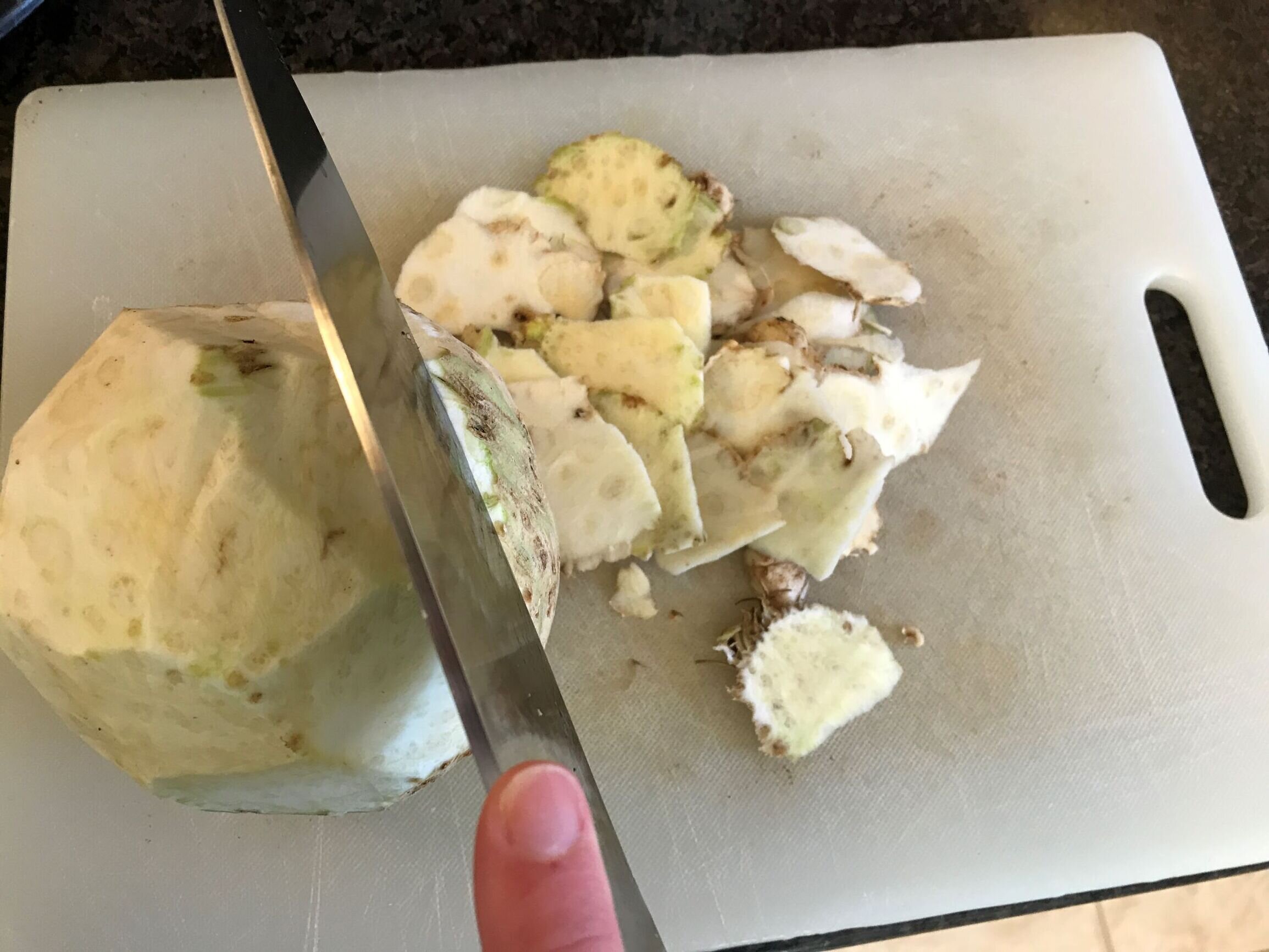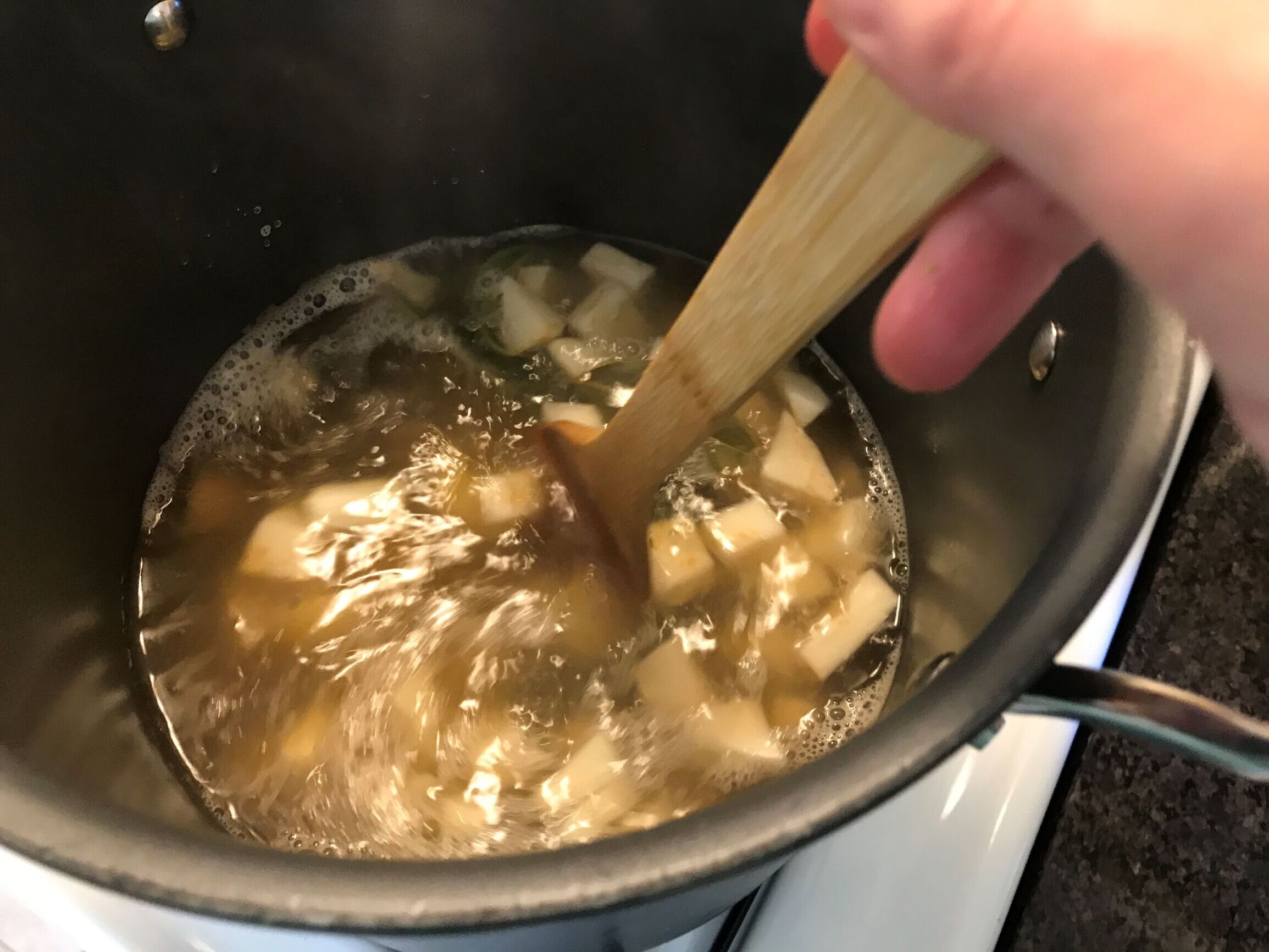Perfect Holidays Celery Root and Potato Mash
As I shared in our foundational celery root post, Mike and I love to eat this funny looking root thanks to our dear friend Basia. Developed from the ancient and wild version of celery, this versatile root shares its lineage with parsley, carrots, anise, and parsnips — all members of the Apiaceae family of plants. Cultivated as a cool-weather plant, it is commonly used in European cuisine and favored for its nutty, celery-like flavor and extended storage capabilities.
Why did Basia grow up with this food and we did not?
Celery root is one of the oldest root vegetables in recorded history. Native to the Mediterranean, ancient Egyptians, Romans, and Greeks used the root for medicinal and religious purposes. Botanists first recorded descriptions of it in Italy and Switzerland in the 17th century. Chefs in France first recorded it as a culinary ingredient around the same time. Roughly 100 years later, it was a common vegetable for cooking across much of Europe, though still hardly known in England at the time. It never fully caught on in the U.S., but that’s starting to change. In recent years, I’ve enjoyed several meat dishes on a bed of celery root mash at a few creative restaurants in Chicago or in my travels. We’ve started to see them more and more in mainstream grocery stores. When those stores are not carrying them, you can find them in European grocery stores.
My guess on the reason celeriac has been slower to catch on in the U.S. is that as Americans, we are quite satisfied by the potato, which was first cultivated in ancient South American cultures, brought to Europe in the 1500s, and then initially cultivated in patches by Scots-Irish immigrants settling in the eastern United States in the 1700s. Its influence quickly spread across the U.S. and established the strong “meat and potato” heritage still common in many home kitchens and restaurants today.
Is this vegetable with the ugly and odd looking exterior good for us?
The clear answer is “yes”! High in antioxidants and key minerals, fiber, and vitamins B6, C and K, this root is associated with a number of health benefits including protection against cancers, improved digestion, and heart and bone health. And it has fewer carbs than a potato.
Celery root ranges in size. Aim to purchase the smaller-to-medium sized ones for best taste. Sometimes the largest ones can lack full flavor.
I am super-excited to share this foundational recipe of celery root and potato mash. I had been making our favorite winter soup for several years — celery root soup (upcoming blog post) — and one day I thought, why not mash this with potatoes for the holidays?! I’m sure Basia also planted this seed in my mind. So I experimented a bit, checked out recipes of boiling times for each vegetable recognizing most likely I’d need to put the celery root in before the potatoes, and came up with a mash of part celery root and part potatoes. It was super easy. Simply making mashed potatoes but sharing the ingredient list with the celery root. And it was yum. Since then, I’ve discovered a number of cookbooks and online recipes that have validated what I was working with and have suggested slight variations and additional flavorings.
One of the key things I’ve learned is it’s best to boil the both the celery root and potatoes in either chicken or vegetable broth as this enriches the overall flavor versus simply boiling in water.
I have added celery leaves to this and I have added other herbs. As herbs are about the only thing we grew this summer beyond our fruit trees and bushes given we’ve been living in a rental home during our Happy Boolo renovation, I thought “let’s use the herbs we have.” But if you want this to be totally easy, no need for these herbs. Just the celery root, potatoes, broth, milk, butter (or non-dairy substitutes), salt and pepper. Voila — you have an amazing unique mash to indulge in for the holidays that is sure to inspire conversations and requests for seconds.
Ingredients at the ready
Ingredients:
Serves: 4-6 people
You can scale this up for larger groups. The main thing to remember is to have the same amount of celery root as potatoes. In nearly any recipe, I also tend to use more fresh herbs than I even call for in the recipe. I LOVE fresh herbs especially those from my own garden.
1 pound of celery root trimmed and cut into small chunks
1 pound of potatoes - my preference for any type of mash is the Yukon Gold potato - peeled and cut into small chunks
1 quart container of broth - chicken or vegetarian
2-3 cups water
6-10 sage leaves
6-8 sprigs of thyme
4-5 sprigs of fresh parsley
2 bay leaves
Milk - non-dairy substitute for vegetarian version
4 tablespoons butter - salted or non-salted depending on your preference
Coarse or kosher salt and freshly ground black pepper to taste
Recipe:
I have reviewed many celery root and potato mash recipes, and there are many possible variations. My Happy Boolo recipe happens to take inspiration from The Cook and the Gardener: A Year of Recipes and Writings from the French Countryside by Amanda Hesser and a Bon Appetit online mash recipe.
Tie the herbs together with kitchen string to assemble your bouquet garni.
Place the celery root and bouquet garni in a large pot. Pour in your broth and add water so you have enough liquid to boil the celery root along with the potatoes. As celery root takes longer to cook and soften, you start by bringing the celery root to boil without the potatoes.
Once you have cooked the celery root for about five minutes, and the pieces are on the verge of becoming just a bit tender, add the potatoes. Cook for another 15-20 minutes until they are tender when pierced with a fork.
Drain the liquid and discard the bouquet garni. Put the vegetables back in the pot on medium heat for 1-2 minutes to cook off any excess moisture.
You can make your mash in your pot or you can make them in a stainless steel bowl (as I do) that can sit on the stove on the lowest possible heat setting. Add the butter and milk and use a hand potato masher or handheld mixer to mash until the tenderness you desire. We prefer ours to have a bit of chunkiness and creaminess to it.
Salt and pepper to taste.
Happy Eating!
In this instance, I enjoyed shopping at Deli 4 You to select celery root.
And the good fortune of having sage and thyme still thriving at the site of our renovation
Peeling the celery root with a large knife
It’s always a good idea to rinse before cutting and after
Celery root cut into bite size pieces
Prepping the potatoes
Cutting into similar size pieces as the celery root
Weighing to make sure we have even amounts of each vegetable - in this instance I added one more potato after peeling so I had a pound each
Bouquet garni ready for assembly - homegrown sage, thyme and bay leaves and parsley from Whole Foods
Ready for use
Ready for the boil
Celery root in
Broth in - substitute vegetable broth for vegetarian version
Water in
Toss in a few sprinkles of salt for the boil
Stirring from time to time
Potatoes in once celery root has a slight bit of tenderness so vegetables cook in same timeframe
Remove bouquet garni
Veggies drained
Back in the pot to cook off any excess moisture on medium heat - 1-2 minutes
Ready for mashing - love this part!
Just four simple ingredients make this delicious - use non-dairy alternatives for a vegetarian option
I like to use a manual masher as a first step to crush the veggies and mix in the butter. I am doing this on the stove on low heat.
Milk in!
Handheld mixer does the trick.
Season to taste with salt.
Season to taste with pepper.
I adore making this dish!
Celery root potato mash garnished with parsley and melted butter - ready for a holiday gathering or quarantine meal for two! :)
Excited to enjoy sauteed chicken thighs with pan sauce on a bed of our celery root potato mash complemented by sage and thyme roasted broccoli, carrots, and mushrooms
My boolo digging in!
Stay tuned for more celery root delights! Thanks to Basia for the inspiration to adopt this wonderful root into our kitchen routine!

































